
Girona is a region that places enormous value on pork and pork products, a fact that has been documented in literary classics by historian Strabo and poet Martial, who praised the nobility of Cerretano hams. The Greek sage Strabo (c. 63 BC – 24 AD), in Chapter 4 of Book III of his opus Geography, wrote: “The Iberian slopes of the Pyrenees have beautiful forests of trees of all kinds, especially evergreen. The Celtic side is bare; but the central areas contain perfectly habitable valleys. Most of them are occupied by the Cerretanos, a people of Iberian lineage, who make excellent hams, comparable to the Cantabrian ones, which provide no small income to its inhabitants”. The Roman poet Martial also championed the ham of these regions in Book XIII of his Epigrams: “Let them serve me ham from the country of the Cerretanos (…)”.
Good pigs, good hams and great imagination are necessary to fill the pantry with marinated, stuffed and dried delicacies from these much-loved animals, which until the end of the nineteenth century were dark-haired. Today the situation is similar: each village has its artisan butchers, who compete to offer the best sausages; every town boasts of making the best pork-based products. Some companies have contributed to improving the quality of pork-based products in general, which has led to even better sausages and charcuterie, whether cured or cooked, thin or thick. As a result of this constant evolution, bread with oil from the time of the Iberians, thanks to the introduction of many products from the Americas, was transformed into Catalan tomato bread. And tomato bread with sausages and charcuterie became one of the cornerstones of Catalan gastronomy.
Sausages and charcuterie with the 2023-2024 Girona Excel·lent seal
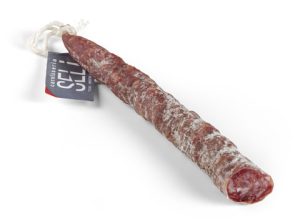
Fuet
Fuet also called espetec (snap), is one of the most typical dried sausages in Catalan gastronomy, which places a premium on pork. It is long and thin, whitish on the outside and pink on the inside, and is usually eaten soft, although it used to be left to age for a long time until it acquired a rigid consistency; this is why, when it was broken with the hands, it made a very characteristic dry ‘snap’ sound, hence the name by which this product is known today. At Carnisseria Seli, established in 1971 in Torroella de Montgrí, they make the fuet with pork shoulder, bacon, salt, pepper and a little nutmeg (which must be their secret), all stuffed into semi-cured pork intestine casings.
Company: Antoni Vilà Rodriguez

Country-style llonganissa
This dried pork sausage made by Albert Santaugini Homs in Sant Hilari Sacalm is one of the most well-regarded and recognised in Catalonia. In fact, it has won a national competition, in which many of the best sausages from Catalonia competed. It is made using the finest cuts of pork and a little fat, all chopped and mixed with salt, sugar, pepper and natural ferments. It is then stuffed into pig sausage skins and left to dry, until it reaches its optimal drying point. At Carns i Embotits Homs, a butcher’s shop established in 1961, they leave it to dry for a minimum of 25 days at a temperature of between 13 ºC and 14 ºC.
Company: Albert Santaugini Homs
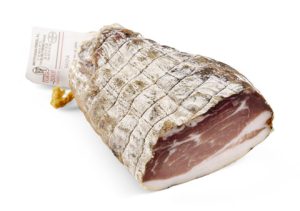
Bayonne-style ham
Lluís Boada started out very early in the world of meat: from a very young age he was already taking part in pig slaughters. In 1976 he opened his own butcher’s shop with his wife, Pilar Pons, in Vilobí d’Onyar, where they began making artisan sausages. This delicious Bayonne-style ham, well-marbled with fat, is part of their range of 25 products made from 75% Duroc pigs that are raised on their farms.
Company: Embotits Boada Porcel S.L.
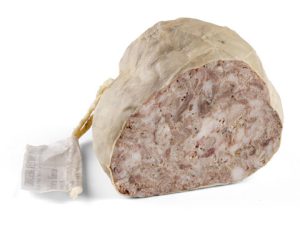
Botifarra blanca (white sausage)
Artisan butcher Xavier Alemany Juanola, from Banyoles, where he has his workshop, founded the Carnisseria Alemany butchers in 1998 at the Lleó Market in Girona. Their main aim is to maintain traditional production methods, to ensure food safety and quality, and to transmit and disseminate the traditional artisanal products of Catalonia. As a result they have been recognised several times by the Girona Excel·lent seal and won national competitions. At Carnisseria Alemany they prepare this cooked sausage so typical of the matança (home slaughtered pig) with pork jowls, streaky bacon, pork, salt and pepper, which they stuff into casings of different thicknesses and lengths. The most highly-rated white sausage is usually the one made with the pig’s large intestine.
Company: Xavier Alemany Juanola
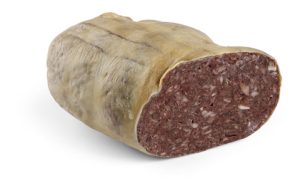
Botifarra negra (black sausage)
When Antoni Vilà joined the family business in 1989 he introduced innovations, while maintaining and enhancing the traditional production processes. As a result, Carnisseria Seli obtained the distinction of an artisan food company in 2006, and in 2008 Antoni Vilà was awarded the diploma of Master Food Artisan awarded by the Generalitat de Catalunya. This black sausage is made with pig’s blood, head, belly, jowls, lungs, and salt and pepper, and is stuffed in sausage casings and the large intestine (peltruc). It is ideal to eat with tomato bread, to make omelettes, or to add to stews and rice dishes.
Company: Antoni Vilà Rodriguez

Botifarra de perol
The botifarra de perol, made with small pieces of pork meat from the head, chin, heart, tongue, belly and nose, plus salt and pepper, is also known as botifarra de parracs (rags). This sausage, stuffed into a thin natural casing, is one of the tastiest and most versatile sausages in Catalan cuisine, both for home kitchens and restaurants. Embotits Artesans Gori, a delicatessen that has been operating in Sant Privat d’en Bas in the Garrotxa area since 1925, make their pork sausage with meat from the head, jowls and heart, with salt and pepper, and cook it in a kettle or boiler (perol), which is how it gets its name.
Company: Gregori Lòpez Codina
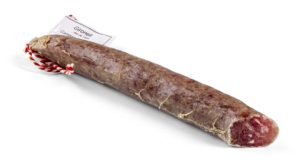
Fuet dolç (sweet fuet)
Joan Gironell is the third generation in a family butcher’s shop that opened in 1944 in Girona’s old quarter and produces the sweet fuet that has been rated the best by experts for the second consecutive edition of Girona Excel·lent. This fuet, made with a mixture of pork shoulder, sugar, salt, grated lemon rind and cinnamon, then left to dry, can be found at their stall at the Lleó Market in Girona. With a white crust from the sugar and its pink and shiny flesh, the fuet dolç is the most genuine charcuterie product from butchers in Girona province.
Company: Joan Gironell Gabarrón
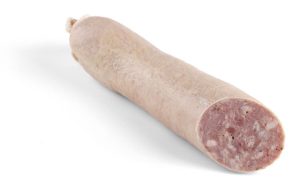
Catalan botifarra
Lluís Boada expanded his butcher’s shop and after 10 years opened his current workshop. In 1987, he partnered with his sister Elvira and brother-in-law Josep Porcel to set up the company Embotits Boada Porcel. They expanded their business to be able to sell the artisan sausages to butchers in the area. Later, they set up their own farms. This Catalan sausage is made with 75% Duroc pork, about 100 kg per carcass. To make it, the best meat is chosen, chopped and spiced, then stuffed into natural casings and cooked. This sausage is ideal to eat with a llonguet (traditional bread roll) well soaked in fresh tomato and a drizzle of olive oil.
Company: Embotits Boada Porcel S.L.
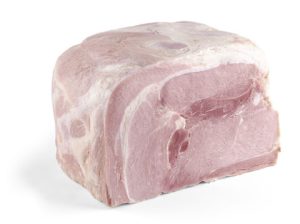
Cooked ham
A century ago, in the roaring 1920s, cooked ham arrived, a product with an attractive pink colour achieved by adding curing salts which are also essential in the preparation of Catalan botifarra. The baked ham from Carnisseria Xarcuteria Laura, in L’Estartit, is made with boneless pork leg and free of any extra fat and gristle. This baked ham is made without undergoing the massaging process, so after it is injected with brine, it is left to rest for four to five days before being moulded and baked. Laura Cabezas reminds us that the ham must be eaten immediately after cutting it, either in thin slices or shavings.
Company: Laura Cabezas SL

Country-style paté
The third generation at Embotits i Patés Costabona in Molló is now preparing this classic country-style paté according to their grandfather’s recipe, who was of French origin. It is made with pork jowls and liver, whole cow’s milk, eggs, wheat flour, salt, pepper and curing salts. This country-style paté was also the first product that this business made in the Pyrenees when they opened their shop in the 1960s. The grandparents had a shop in the town square where, in addition to basic groceries, they sold products that they produced themselves.
Company: Francisco Aspar Ricart

Pa de fetge (liver sausage)
Dedicated to food and gourmet products since 1979, Carnisseria Pons in Llívia is currently run by the fourth generation. The brothers Josep Maria and Marta Vila Pons make pa de fetge with pork jowls, lean meat, liver, salt, pepper, garlic, parsley, milk, eggs, sherry and caul fat. Known by different names on both sides of the Catalan Pyrenees, this gastronomic delight is a classic pork product and one of the most characteristic of the region of Cerdanya, where it is made.
Company: CAVIPOX17 S.L.
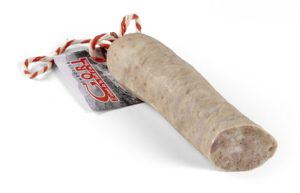
Botifarra de llardons
Pork rinds or scratchings, known as llardons, greixons or greixots de la mocada, are soft, tasty and crispy when freshly made, and have been the best-kept secret of Garrotxa cuisine for many years. They are part of the recipe for the sensational coca de llardons (pork rind flatbread) from Olot. Embotits Artesans Gori, a delicatessen in Sant Privat d’en Bas in the Garrotxa region since 1925, have created this sausage based on lean pork, ground scratchings, egg, salt and pepper, all stuffed in natural casings. Accompanied by bread, it is addictive.
Company: Gregori Lòpez Codina
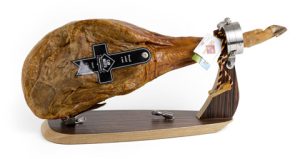
Can Mateu ham
Can Mateu ham is made with selected legs of the Duroc pig breed with a source weight of between 12 and 14 kilos. They are cured for a minimum of 24 months in cold storage until reduced to 35% of their initial weight. This meat company from Olot is recreating the artisan ham that used to be made in the farmhouses of the Garrotxa region, but now applying today’s technical and sanitary guarantees. The result is a very aromatic product with a strong umami taste.
Company: Pernils Can Mateu SLU
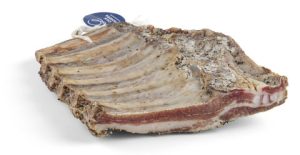
Dried pork ribs
Can Fanera, located in Plaça de la Vila, in La Cellera de Ter, since 1928 has brought in innovations with these salted and dried pork ribs, following the recipe for the great cured sausages. The fourth generation at Can Fanera suggest cutting the ribs into thick strips and eating them at room temperature. The dry rib is perfect for an aperitif or snack. It can be paired with cava, vi ranci or dry white wine, and accompanied by some sweet coca (flatbread) or bunyols (doughnuts).
Company: Fanera, SL